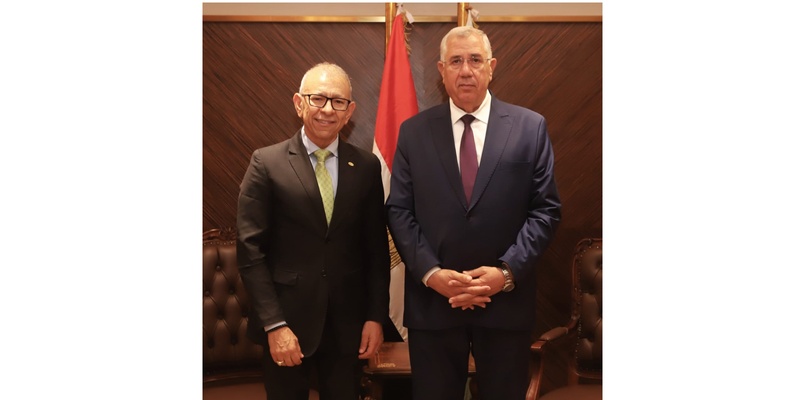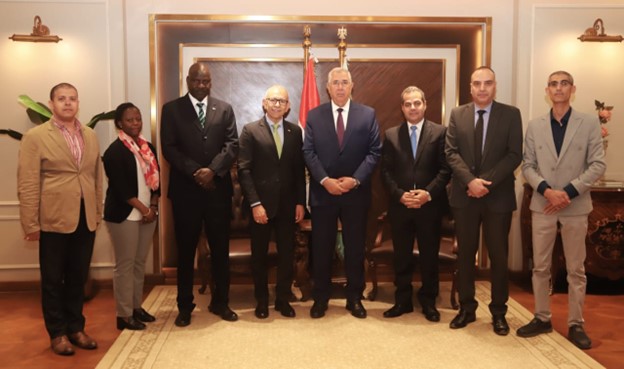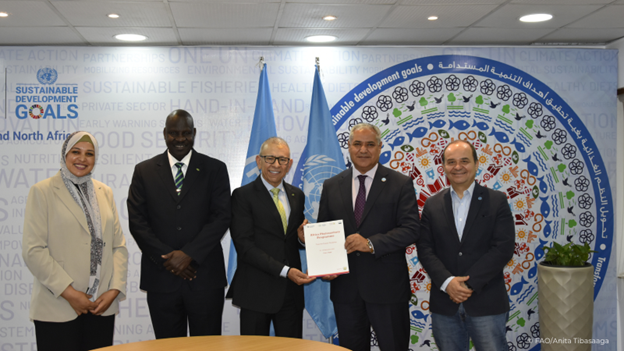Egypt embraces Africa Phytosanitary Programme
Posted on Вт, 28 Май 2024, 08:21

© MoALR
Cairo, 27 May 2024. The Government of Egypt and the International Plant Protection Convention (IPPC) Secretariat have reaffirmed their commitment to working together to strengthen the technical capacity to prevent and mitigate the impact of plant pests and diseases on crops in Egypt.
H.E. El-Sayed Mohamed Al-Quseir, Minister of Agriculture and Land Reclamation and Osama El-Lissy, IPPC Secretary, met on Sunday 26 May to discuss the implementation of the Africa Phytosanitary Programme (APP).
APP is an IPPC initiative designed to transform the technical capacity of Africa’s phytosanitary personnel within national plant protection organizations (NPPOs), using scientific evidence, advanced technology and tools to monitor, prevent, detect and manage plant pests. Through APP, the IPPC Secretariat supports countries to strengthen their national surveillance and diagnostic frameworks by developing and applying survey identification protocols for priority pests, training personnel and providing field tools to boost pest monitoring and detection.
Minister Al-Quseir commended the IPPC Secretariat for acknowledging the significant challenge posed by plant pests and diseases in Africa. Many countries in the continent rely on agricultural production for nourishment, as well as for the livelihoods of those involved in the agricultural supply chain, which in turn impacts the national economy, international trade, and global cooperation.
He emphasized Egypt's preparedness to serve as a regional hub for the IPPC training, which includes digital technology and scientific know-how on pest detection and surveying techniques. The Minister noted that choosing the Arab Republic of Egypt in the pilot phase of the Africa Phytosanitary Programme, within the scope of North Africa, is a nucleus for completing the programme in all African countries in the future.
IPPC Secretary El-Lissy was very pleased with the Minister’s views on Egypt’s leadership in Africa as plant pests do not respect geographical boundaries. “Once countries know and can prevent pests, they can ably prevent their entry into new areas where they can devastate crops, biodiversity and the environment,” said El-Lissy. “The IPPC Secretariat is confident that APP, which is envisioned as part of a global phytosanitary programme, will significantly improve agriculture production, food security, environment, and trade in Africa and beyond,” he added.
Minister Al-Quseir also commended the IPPC Secretariat for recognizing the immense challenge that pests and diseases cause in Africa, where most countries rely on crop production for food, income for those involved in the production value chain, national economy, international trade and global cooperation.
The meeting was also attended by Dr Saad Moussa, Supervisor of the Central Administration of Plant Quarantine (CAPQ), which is also the national plant protection organization (NPPO) of Egypt, Prof Dr Ahmed E. Abd El-Mageed, Director of the Plant Protection Research Institute, Dr Nader Badry from CAPQ and Arop Deng, Team Lead of the Integration and Support Team at the IPPC Secretariat.
Africa loses billions of dollars in pre- and post-harvest crop damage of 30 – 40 percent every year caused by various plant pests. This crop devastation causes food shortages in many parts of the continent and worsens food insecurity. Fall Armyworm for instance, which affects over 80 plant types such as wheat and maize – a staple for many countries – causes nearly USD 10 billion loss worth of crops annually in Africa alone. Climate change has exacerbated plant pest outbreaks and other negative impacts on human, animal and environmental health, including increased risks from pesticide misuse and mismanagement.

Africa Phytosanitary Programme as a practical intervention
APP also aims to support countries to effectively implement international plant health and safety standards, promote safe and sustainable trade in agricultural commodities, foster food security and contribute to economic growth through more sustainable agricultural production and productivity.
The IPPC implements APP in collaboration with the Food and Agriculture Organization of the United Nations (FAO) and the African Union Department of Agriculture, Rural Development, Blue Economy & Sustainable Environment, the United States Department of Agriculture (USDA).
The first Train-the-Trainer workshop, during which APP was officially launched, was held in Cairo in September 2023. Subsequently, countries have started training national-level plant health teams, to further strengthen Africa’s technical plant health human resource.
Secretary Osama also met AbdulHakim Elwaer, FAO Assistant Director-General and Regional Representative for the Near East and North Africa. “The APP is not only ambitious but is a well-structured and practical programme that meets the country's needs,” said Elwaer. “Strengthening capacities on advanced plant health science and state-of-the-art digital tools will play a crucial role in protecting food security and minimizing trade disruptions related to plants and plant products. Importantly, this should be integrated with the wealth of indigenous agricultural knowledge to create more holistic, sustainable, and culturally relevant phytosanitary programmes that benefit both local communities and the global ecosystem,” he added.

In Egypt, APP is being implemented by the Central Administration of Plant Quarantine (CAPQ), the NPPO of Egypt. Other pilot countries are Cameroon, Democratic Republic of Congo, Guinea-Bissau, Kenya, Mali, Morocco, Sierra Leone, Uganda, Zambia and Zimbabwe. CAPQ has developed an operational plan and intends to train 50-100 plant health inspectors annually. The first training will focus on survey for pests and diseases of Citrus sinensis and Vitis vinifera which affect citrus and grapevine production respectively, which are essential cash crops for Egypt.
Dr Moussa emphasized the effectiveness of utilizing prevention approaches to manage plant pests and diseases and reiterated his commitment to strengthening Egypt’s phytosanitary capacity to monitor, detect, respond and prevent pests from impacting the agriculture sector.
About FAO
The Food and Agriculture Organization (FAO) is a specialized agency of the United Nations that leads international efforts to defeat hunger. FAO’s objective is to achieve food security for all and make sure that people have regular access to enough high-quality food to lead active, healthy lives. FAO works to transform agri-food systems by promoting sustainable production and consumption, including protecting the world’s plants to achieve global food security. FAO works in over 130 countries worldwide and has 195 members - 194 countries and the European Union.
About IPPC
The IPPC is an international treaty ratified by 185 countries, aiming to protect the world's plant resources from the spread and introduction of pests, and promoting safe trade. International Standards for Phytosanitary Measures (ISPMs), developed under the auspices of the IPPC, assist countries in implementing national phytosanitary standards and import requirements. The IPPC, deposited at FAO, is the sole global standard-setting entity for plant health.
Contact
- Mohamed Ali Moussa, Communication Specialist, FAO Regional Office for the Near East and North Africa. [email protected]
- Anita Tibasaaga, Communications Specialist, IPPC Secretariat. [email protected] -Saad Moussa, Central Administration of Plant Quarantine (CAPQ), Egypt. [email protected]

